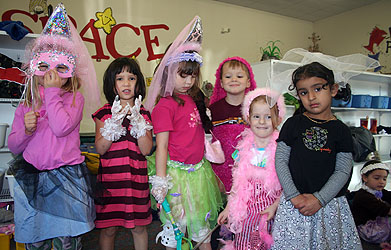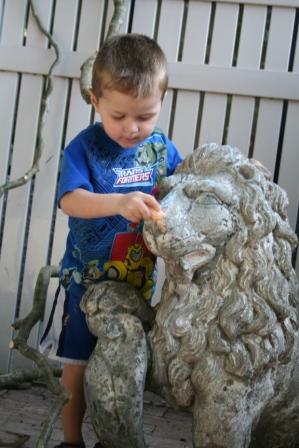 Imaginative play is considered a normal part of every childhood. Virtually all children enjoy dressing up as firefighters or doctors, running a restaurant, or saving the village from the ferocious dragon – the possibilities are limitless. However, while most adults view pretend play as a fun diversion, it actually possesses enormous educational value. In clinical terms, there’s a lot of development going on here! Here’s a look at just a few areas that imaginative play encompasses.
Imaginative play is considered a normal part of every childhood. Virtually all children enjoy dressing up as firefighters or doctors, running a restaurant, or saving the village from the ferocious dragon – the possibilities are limitless. However, while most adults view pretend play as a fun diversion, it actually possesses enormous educational value. In clinical terms, there’s a lot of development going on here! Here’s a look at just a few areas that imaginative play encompasses.
Benefits of children engaging in pretend play
Complex social and higher order thinking skills. Children develop thinking strategies, communication and social skills. Say a group of children is preparing to act out the scenario of a family outing. They experience the negotiation process of who assumes the role of father, mother, etc. Then, children must brainstorm ideas for their scenario, learning the give-and-take of collaboration. When play does commence, children assume a role and must consider the perspective and feelings of the characters they’re playing. Through the scenario, they must process what’s occurring and act logically within the framework of the reality they’ve constructed.
 Language skills
Language skills
If you closely listen to children during any type of imaginative play, you may be surprised to hear words or phrases that may seem a little anachronistic for preschoolers. Children will often mimic their parents, teacher, or other adults they’ve heard – or, through the character they’re inhabiting, they’ll explore different ways to approximate their “voice.” Not only is imaginative play is a means of unlocking this knowledge; it gives them a forum to use it.
Life issues
By virtue of their age, most children are inexperienced in the ways of the world. Imaginative play is a way of exploring their inherent curiosity, and this includes tough subject matter. It can help a child cope with issues that may seem scary or confusing in a comfortable environment. For example, acting out receiving a shot from the doctor can serve as a “rehearsal,” and make the actual needle seem not so intimidating. Or, in the case of a sick grandparent, imaginative or pretend play can help a child express the feelings of uncertainty that they might not otherwise be able to through normal conversation.
Self-Esteem
While childhood is a carefree time, children do spend a fair amount of time searching: for their voice, for acceptance, and to be understood. Pretend play is a tool to take control of their world and discover how they wish to express themselves, “try on” different personalities, and have fun as someone else. In doing so, it can imbue them with a confidence that carries over after imaginative play has ended.
Daycare in Vancouver WA
As a parent, you can help facilitate pretend play by keeping some props handy: a bag of clothes, a non-working phone, utensils, and extra blankets can translate into hours of fun and exploration. Better yet, why not join in? Contact Kidspace for more information about how daycare can inspire your child and teach them valuable skills for life.

 Schedule Tour
Schedule Tour